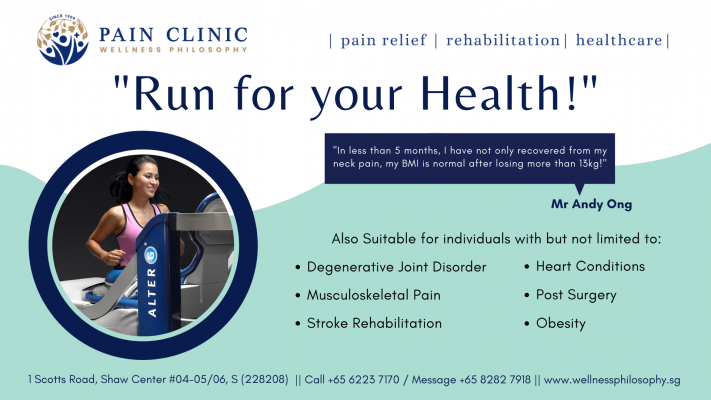No products in the cart.
Fitness, Therapy, Weight Loss
Muscle Degeneration (Sarcopenia)
What is Sarcopenia?

Two recent epidemiological studies in Singapore, the Yishun Study and GERI-LABS 2 study, found that the prevalence of sarcopenia in the local community is between 27.0-32.2%. There is a direct association between sarcopenia and frailty,increased age and type 2 diabetes mellitus.
Sarcopenia is the loss of muscle mass due to the natural aging process of the body. The body muscles grow stronger and larger from the day you were born till somewhere in the 30s. From around your 30s you start to lose muscle mass and functions. This loss of muscle mass can then affect one’s balance and gait. People who are physically inactive may also see 3% to 5% muscle loss each decade after their 30s.
A person’s quality of life can be affected by Sarcopenia by:
- Reducing a person’s ability to perform simple daily tasks such as walking up the stairs or getting out of bed.
- Increasing risk of dependency for care due to any significant and continuous loss of muscle.
- Discourage physical activity of the patient leading to further muscle loss.
This will lead to other health issues, such as:
- Increased risk of falls and fractures.
- Metabolic problems such as type 2 diabetes.
- Increased risks of high blood pressure and obesity.
This age-related process of qualitative and quantitative muscle loss is now considered the precursory process of clinical frailty. Clinical frailty is associated with poorer quality of life, with an increased risk of hospitalisation, surgery morbidity and mortality.
Symptom & Causes of Sarcopenia:

Weakness of muscle and loss of stamina are the common symptoms of Sarcopenia. A reduction in physical activity further contributes to muscle loss.
Some symptoms include:
- Falling
- Muscle Weakness
- Difficulty performing daily activities
- Slow walking speeds
- Loss of stamina
Although Sarcopenia can be developed due to physical inactivity, research also shows that people who are physically active can get it. This shows that there are more factors that contribute to sarcopenia, such factors are such as:
- Low concentration of hormones such as growth hormones, testosterone and insulin-like growth factors.
- Reduction in ability to process protein into energy.
- Lack of certain calories and proteins to sustain muscle mass.
- Reduction in nerve cells responsible for sending signals from the brain to the muscle for motion que.
Preventive Measures for Sarcopenia:
A majority of people suffer from this condition due to the lack of physical activity. Firstly putting in place an exercise routine in your life, may reduce your risk in developing Sarcopenia. Just 30 minutes of moderate exercises each day such as jogging or running, will help keep the body systems healthy and fit.
Having enough protein and nutrients help ensure an effective exercise. Studies show that consuming enough protein for the body during exercise helps reduce the risk of Sarcopenia.
Supplementation is also useful in preventing Sarcopenia, such supplements include:
- Whey protein for preservation of body muscle mass.
- Creatine for increasing and maintaining muscle mass.
- Vitamin D for maintaining muscle and bone tissue.
Therapy Programs For Sarcopenia:
Our consultants will tailor a program specially for you by diving into understanding your lifestyle. From your circadian cycle, your diet to the physical demands of work that you go through daily. We will not only help rehabilitate your condition but also equip you with the necessary tools to prevent any future relapses or aggravations.

Whether you lead a sedentary lifestyle due to your job, or if you have any pre-existing muscle or bone conditions. Our rehabilitative services include putting in place the necessary safety measures and walking you through your very own specially curated exercise routines. A properly prescribed exercise routine in intensity, repetitions and frequency is important. This way you can get the most benefits while lowering any risks for accidental harm.

A clinically advanced non-invasive equipment. This intervention increases blood flow, stimulates muscle repair and regeneration and also increases metabolization on the cellular level. This helps patients with pain by reducing any joint inflammations. Improves muscle imbalances and creates healthy circulations for your joints. It also helps loosen scarred tissue from chronic muscular conditions as well as other pain conditions.

State-of-the-art technology that has helped our patients efficiently rehabilitate, strengthen muscles and lose weight within a short time frame. This advanced tech is able to reduce body weight of up to 90 percent during exercises such as walking or running. This helps relief any pain and pressure applied to the knees from patients that may be obese, or have any existing chronic knee issues. It helps boost patient’s performance during the exercises within the machine, Increasing their heart rates to efficiently burn calories. At the same time, our consultants will be able to analyze and help improve our patient’s gait/movement/pattern while walking and running.
Supplements for Sarcopenia:

A deficiency in B12 can lead to muscle weakness and diminished reflexes. B12 helps aid the increase of metabolism on fat and amino acid. Helps with red blood cell formation that is essential to improving muscle mass for exercise. Supports bone health and prevents osteoporosis. Help the brain by preventing loss of neurons. Supports healthy hair, skin and nails while improving cardiac health.

The administration of vitamin D may improve muscle strength and muscle mass. This will be useful for the prevention and further supports therapeutic intervention of sarcopenia. Vitamin D further increases muscle recovery and lowers risk of muscle damages.
CALL US FOR INQUIRIES: 6223-7170
